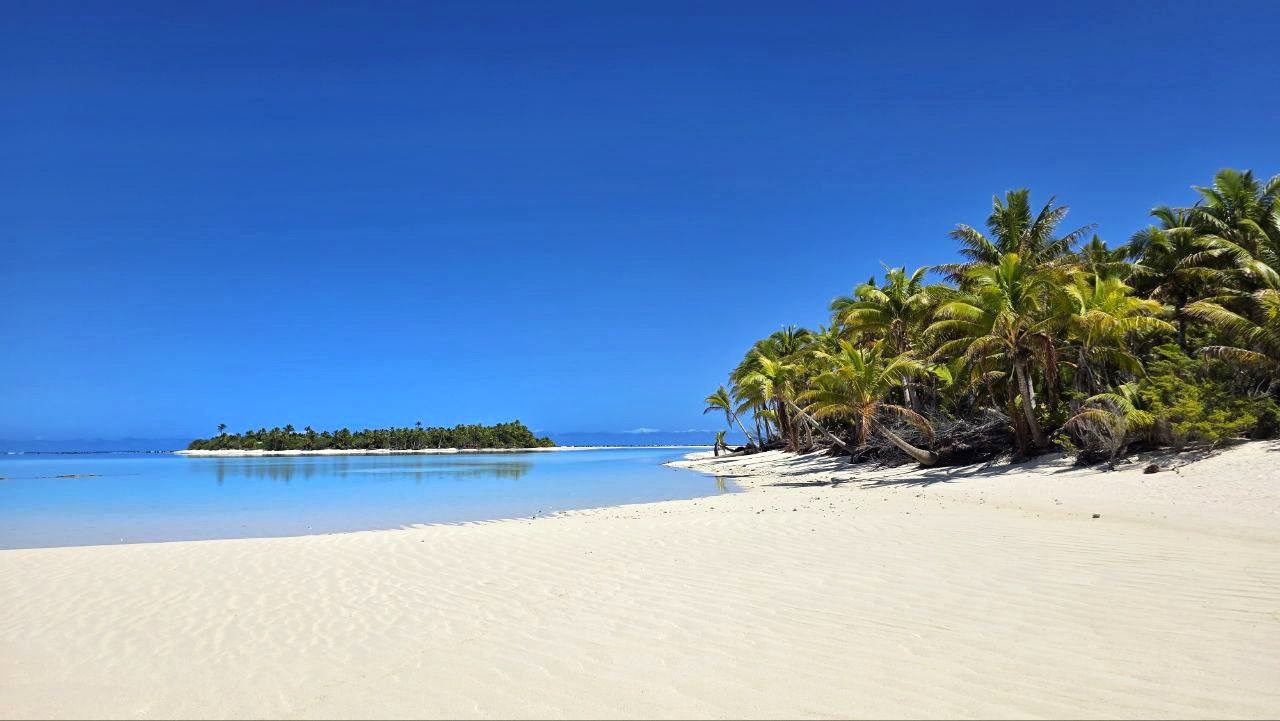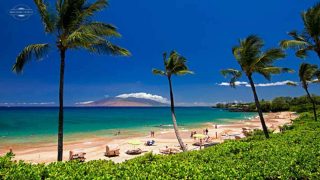We’re writing this from Bora Bora in French Polynesia, where the lagoon glows a shade of turquoise we still can’t quite believe is real. What stands out even more than the view is who we keep meeting, Hawaii regulars who have found their new paradise. Before arriving here, we were in the epic Cook Islands as well, on Rarotonga and Aitutaki (which is our lead photo).
We’ll be sharing our South Pacific adventures with you in the days to come, bringing insights and contrasts in relation to Hawaii.
Over and over, we hear the same story from readers: “We used to go to Maui every year. Now we come here.” These aren’t casual Hawaii visitors. They’re the regulars who built decades of loyalty, and many of them say they’re done.
Visitors leaving Hawaii for alternatives isn’t new. The state’s own data has tracked the shift since travel resumed after the pandemic. But what’s happening now feels different. These are the travelers who know Hawaii best, and they’re quietly choosing the South Pacific instead.
The travelers we’re meeting here.
At dinner last night, a couple from Seattle told us, “We love Hawaii, but it doesn’t feel like it loves us back anymore.” They used to visit multiple times a year. Now they come to Tahiti, Moorea, and Bora Bora.
Ron from Colorado said he and his wife cancelled this year’s month-long trip. “We typically spend $10,000 to $15,000 in Hawaii, but we’re not doing that anymore,” he told us. “Visitors aren’t treated well, costs are ridiculous, and services have gone downhill.”
Ben and his partner from Oregon spent their 5th, 10th, and 15th anniversaries in Hawaii. This year, they celebrated their 25th here in Tahiti. “The Aloha spirit has been challenged for years,” Ben said. “They want our money, not us.” Rick from California said, “We don’t feel as welcomed as we used to. Instead of two or three trips a year to Hawaii, we’ll probably go once, and then we’ll come back to Tahiti. There are abundant tropical paradises waiting.”
The math behind the migration.
We’ve been comparing costs while we’ve been here, and we’ll share them with you this week; the numbers are surprising. The South Pacific isn’t cheap, but neither is Hawaii anymore. We found some significant savings in The Cook Islands on restaurants, activities, and in grocery stores. Not so much, however, in French Polynesia, although the vacation rentals in both places were comparable.
For a couple, a one-week trip to Maui this spring could easily total around $7,000, including airfare, lodging, car rental, and meals. Here in Bora Bora or Tahiti, while you could go nuts on a $4k/night overwater, you don’t need to. That same $7,000, and even less, is feasible here, and especially in the Cook Islands. Some travelers say it feels like they’re getting far more for their dollar.
Dinner for two last night in Bora Bora can be expensive, but we ate at a casual restaurant for $50 per person, and it was excellent. No added surcharges and no tipping expectations in French Polynesia or The Cook Islands. A similar dinner in Waikiki easily costs the same or more, considering tips and taxes.
Our lagoon-front vacation rental on Bora Bora is $375 per night total. In The Cook Islands, our lagoon-front vacation rental on 100 feet of beachfront was $218 total. We are hard-pressed to find the equivalent at home in Hawaii. If we do see the same cost in Hawaii, it is before resort fees, 19% tax, and sometimes parking.
Activities, such as lagoon tours, are on average $150 per person, comparable to the same price on Maui. We also chartered a boat for five hours on the Aitutaki lagoon in The Cook Islands for $379 total. More on that will be coming.
It’s not that the South Pacific is cheap. It’s that prices have gone up in Hawaii, and here, the experience feels aligned with the price, without surprise charges.
Other destinations are cheaper, but they’re still not Hawaii. We’ve said that before. And yet, what we’re seeing here makes it harder to ignore that, for some travelers, Hawaii’s prices no longer align with the expected experience.
It’s not just about the money.
Hawaii’s appeal has always been emotional, not economical. But when that emotion fades, price becomes the deciding factor. Many travelers say they used to justify Hawaii’s higher costs because it felt personal, special. They were treated like family. Now, they describe feeling like merely transactions.
In contrast, what they’re finding across the South Pacific feels somewhat more genuine. One Hawaii result told us that “Everyone here smiles and wants you to love their island. In Hawaii lately, it sometimes feels like you’re intruding.”
We can’t concur completely, and overtourism is as real in French Polynesia and the Cook Islands as it is in Hawaii. The difference is largely in the numbers where Hawaii gets ten million visitors, while Cooks gets under 180,000, and French Polynesia hovers above 300,000.
We’ve felt some interesting contrasts here ourselves. There remains a kind of easy hospitality that exudes what Hawaii built its entire tourism legacy on, yet seems to be struggling to sustain.
What Hawaii is losing.
These aren’t first-time visitors or backpackers with whom we are talking. They’re some of Hawaii’s most valuable travelers, the repeat guests who used to come every year and spend generously. They’ve built decades of loyalty, and once they find new destinations that meet their expectations, they’re far less likely to return.
As we saw in our visitors leaving Maui report, longtime visitors are quietly saying they’re not coming back. Multiply that across thousands of travelers, and the pattern becomes impossible to ignore.
We’ll have more to share from each South Pacific stop soon, including Rarotonga, Aitutaki, Tahiti, and Bora Bora. Still, even before writing those reviews, it’s clear that Hawaii’s competitors are offering something it no longer reliably can: peace of mind. In the days ahead, we’ll dive deeper into what we’ve seen across these islands, what Hawaii can learn, and what travelers should know before considering making the switch.
Of course, it isn’t all effortless paradise.
We’ve run into more surprises than we even expected. They ranged from issues with Hawaiian when doing the triangle trip (Honolulu-Rarotonga-Papeete-Honolulu) vs. a round-trip, driving on the opposite side of the road in the Cook Islands, together with phones there that won’t connect without local SIM cards, and interisland flights that cost easily double or more what we pay in Hawaii. People in Cooks speak English, though in French Polynesia, it’s French first. We’ll share so much more about what works beautifully and what doesn’t at all as our South Pacific series continues.
What Hawaii still has.
Hawaii’s defenders, including us, will point to convenience – no passport, shorter flights, and totally familiar systems (not to be overlooked). For some travelers, that will always matter. For the ones we’re meeting here, perhaps those that are at least slightly more adventuresome, it no longer does.
There’s still hope for Hawaii’s most devoted visitors. Hawaii could learn from this shift, but only if it is listening in earnest.
The bottom line.
We live in Hawaii full-time. What we’re seeing here in the South Pacific isn’t just competition. It’s a mirror showing what Hawaii has become and what it used to be.
Have you made the switch from Hawaii to the South Pacific? What differences stood out most to you, and what could bring you back to Hawaii? Please share your thoughts below, and look for our upcoming feature articles from the South Pacific.
Lead Photo: © Beat of Hawaii on Aitutaki Lagoon, The Cook Islands.
Get Breaking Hawaii Travel News







Could not have said it any better. That almost described my wife and I. All this Hawaii BS made us find better places to go. We have not gone back since 2022, and we were the 3 times a year people.
I might aspirationally want to visit the South Pacific, but once there would pine for Hawaii. The last trip I took a trip to the Caribbean I missed Hawaii. Do you go to Paris if you want to skip London? It’s not the same.
I’m sticking with Hawaii. I like it and things change. The humpbacks I love in February don’t care what the flight or hotel costs. I’m coming to see them and to swim in the waters in the middle of the Pacific! It’s gotten expensive in my own city, just like every where. As someone above wrote: we receive the Aloha we give.
So they’re done desecrating, Over crowding & buying out our islands so they’re moving on to the next. Well that’s rich. I mean, “I ain’t mad” lol see ya But oh how I hope French Polynesia is smarter than the geniuses that we trusted to protect our islands were.
I don’t know that we would travel further, right now Hawaii is a strain. I do know that we just canceled our trip to Maui and lost money. We’ve been going since 1998 and have missed very few years. When we were there, we would buy local for all the Christmas, Birthday and office gifts. One big shopping trip, often mailing home what wouldn’t fit in our suitcase. When you’re not welcome it does become a very different experience. The article summed it up nicely. We have three of our seven time share weeks up for sale, for $1.00 each. Yes, .99 cents. There are still four left after that but we can always trade them. And we will, because we want to go where we are welcome, so the trip is enjoyable.
The irony of this is that I live here in Hawai’i and family/friends visiting really can only afford to come because they stay at my house – it’s gotten that bad. And, what people are saying is accurate – we’re losing Aloha. I think once we all saw the beach open, could park anywhere at anytime – and get back and forth across the island, it’s been hard to shake sharing again.
What I’d like to see is that Hawai’i “gets it together” and starts the much overdue and needed exploration of other incomes sources. We can’t all complain about “tourists” then allow our representatives not the move the needle on other solutions. Case in point we all love gambling, pretend we’re so against it, yet stuff the flights going to 9th island to visit family/friends..and gamble! Game rooms are busted almost once a month, time to accept reality. Allow even online gaming, sports betting etc and get that tax revenue going. As for travel, even I got to Tahiti and now Fiji…instead.
Sorry to hear and see all the American dollars spent in other countries. Hawaii has no value for the tourist and don’t care to welcome visitors. IMO some day the rich will see no value in Hawaii and then what?
IMO, the first two paragraphs of the “It’s not just about the money” section hit the nail on the head, so I was surprised you couldn’t fully agree.
I’m a Canadian transplant who first moved here in ’89 after winning a visa lottery (Honolulu was my port of entry; I only ever wanted to live in Hilo). I left in ’93 and returned in 2018, thinking it would be for good.
Now I’m not so sure. Since the pandemic, the sentiment you described has intensified. I notice how locals interact with each other versus with me, and compared to years past, the difference feels real—palpable, even. Not all, but many seem to wish haoles like me would just leave. On the continent, we’d call that racism, but here it seems acceptable. I see the vitriol in local Facebook groups aimed at haoles and I mourn. My emotional attachment to this place is fading, and the thought that my sadness might be met with joy makes it all the sadder.
Until last week, we owned a short term rental in Waikiki. Property taxes were oppressive, and the tax authority discriminated against investors. (Remember the “Taxation without representation is tyranny” chant?
We understand why HOA fees climbed through the roof, and that’s totally understandable.
In many of the local population, the Aloha spirit is no longer present. Governor Green has fostered the resentment of tourists. As tourists go elsewhere, I can only wonder how the hard working people in the tourist-related industry will be able to survive. As tourists go elsewhere, people will be laid off. I can only see economic hardship for many in tourist-dependent jobs.
We’re happy to have sold our unit. We loved regularly visiting Hawaii for the last 50 years, and we cherish our memories, but memories don’t spend money.
The greatest part is Gov. Green is from Pittsburgh… can’t make this up!
I will play devil’s advocate here.
Ten years from now, the locals in the South Pacific will voice the same complaints regarding overcrowding, high fees and costs. We may never totally understand the implications and complexities of how socio-economics and politics play a role in Hawaii. As for me, I will be returning to the Aloha state. Life can be better, but right it’s all good!
Aloha and mahalo to the people of Hawaii.
Marky J
After a trip to New Zealand last year, we stopped in Fiji and absolutely loved it. The snorkeling was outstanding and the people were delightful and so welcoming.
This year we’re going to the Cook Islands, I’m anxious to read your reviews. So far Kauai is still our go-to, we’ll be there next month and next June. As a frequent visitor (and owner at Lawai Beach) I haven’t felt unwelcome.
I’ve loved Hawaii; since 1977. We’re going for our 4th time this year in 3 weeks. Yes it’s more expensive but everything everywhere is. But the Aloha? You’ve got to give it to give it. And we do. It feels just as magical as it always has to us but it would be fun to try something new. I look forward to your detailed articles about particular islands and how they compare with the Hawaiian islands. Mahalos! 🌺
Our biggest challenge to the Cook Islands and Bora Bora is the distance. Its a long trip to Hawaii but we can tolerate 7 hours.
We are repeat visitors with plans to family for their first visit. We are excited to share with them the Hawaii we love and we have always been treated well. I am hopeful that they can enjoy Hawaii as we have seen it for so many years.
I can’t see myself and my partner doing the South Pacific on any regular basis. We are saved on Hawaii because of the “fixed cost” of accommodations via our condo. But the rental car and airfare are making it a real challenge. Right now we are shopping for next summer and the airfare ATL-HNL literally Doubleed in price while we were on the airline app! $700 to $1600 for the same flight. We are hoping for a change on that in the future. But I’m sure our annual month in HI is going to become every other year and maybe longer. It takes a Huge bite out of our travel budget.
Hawaii has taxed and regulated it’s out of the competition. Even outside of the Pacific there are tons of great islands, like Mauritius, the Seychelles, Maldives, even Bahrain and Malta offer a lot of what Hawaii does.
Hi: Long time reader of your posts and long-time traveller to Hawaii. For us the convenience of getting to and from Hawaii, the “ease” of being there (language, internet, phone service), available medical care if required, and the frequent and much cheaper airfares from Chicago make the decision for us a no-brainer. Knowing we could get home immediately if needed is a peace of mind comfort you can’t put a price on. Throw in the incredible local culture, history, beauty everywhere, food, museums, hotel choices, and it’s our “go-to” vacation. We have never encountered anything but the “Aloha Spirit” in Hawaii. Never. We are respectful travellers, not “ugly entitled Americans.” In our experience it is often the other visitors to Hawaii that cause the problem, not the locals. Yes, the costs have grown, but for us the S. Pacific is “one-day we’ll do that” aspirational vacation. Hawaii is the default.
Please stop hyping the Cook Islands. We’re returning in 3 weeks to Rarotonga and Aitutaki and want desperately to keep them a secret!
We are doing more cruises to the Carribean and Bahamas. We can get a suite with butler service, all food and drinks, shows, spa treaments and excursions for $10,000-$15,000 depending on the ship, time of year and itinerary. We use points for pre and post cruise flights and hotel.
For me, Hawaii ne is about friends and my Hanai ohana. Those who do not have connections and are focused on weather and a broader sense of tropical then Polynesia is probably best. Hawaii has been struggling with overcrowding so some trying other destinations will be beneficial, though this may mean a downturn in visitor revenue. I suspect property taxes on mainlander purchases will have to rise to make up for this.